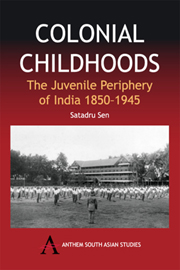Book contents
- Frontmatter
- Contents
- Dedication
- Acknowledgements
- Introduction
- 1 State of the Experiment: Experts, Parents and the Reformatory
- 2 The Nature of the Beast: The Content of Institutionalized Childhood
- 3 Experimental Childhoods: Pain and the Reformatory
- 4 Gendering the Reformatory
- 5 Masters and Servants: School, Home and Aristocratic Childhood
- 6 The Politics of Deracination
- Conclusion
- Notes
- Bibliography
- Index
3 - Experimental Childhoods: Pain and the Reformatory
Published online by Cambridge University Press: 05 March 2012
- Frontmatter
- Contents
- Dedication
- Acknowledgements
- Introduction
- 1 State of the Experiment: Experts, Parents and the Reformatory
- 2 The Nature of the Beast: The Content of Institutionalized Childhood
- 3 Experimental Childhoods: Pain and the Reformatory
- 4 Gendering the Reformatory
- 5 Masters and Servants: School, Home and Aristocratic Childhood
- 6 The Politics of Deracination
- Conclusion
- Notes
- Bibliography
- Index
Summary
In 1853, Charles Hathaway, Inspector General of Prisons in Punjab, wrote a memo to the provincial government outlining the problems posed by juvenile offenders. The system in place for the punishment of children, Hathaway wrote, was a dismal failure. Young vagrants and thieves drifted in and out of British-Indian jails, returning often and becoming progressively delinquent with each visit. Under such circumstances, the Inspector General asked, ‘how is his chance of reformation bettered?’
Hathaway's alarm illuminates an ideological and administrative crisis within the colonial reformatory, shortly after the passage of Act XIX of 1850 and long before the RS Acts and the Bayley-Napier debates. Due to the work of Arnold and Ernst, we are as familiar with the shortcomings of colonial modernity as Hathaway appears to have been. The colonial prison was not Bentham's Panopticon or even Ignatieff's Pentonville, and it would be unreasonable to expect the child inmate to become ‘a hostage in his own hands’. Nevertheless, taking their cue from Foucault, scholars of disciplining institutions have generally made two related points. One is that nineteenth-century modernity was optimistic about the possibility of managing disorderly populations by subjecting the individual offender to measured doses of discomfort. The other is that this modernity was marked by a steady, albeit incomplete, withdrawal from the deliberate infliction of physical injury.
- Type
- Chapter
- Information
- Colonial ChildhoodsThe Juvenile Periphery of India 1850–1945, pp. 89 - 114Publisher: Anthem PressPrint publication year: 2005



